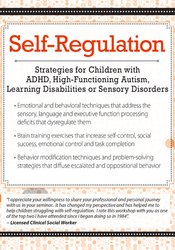

This recording will help you to better intervene with the challenging child – the one who won’t sit still; doesn’t follow directions; often throws tantrums; or has difficulty waiting for their turn. They may “hit first and ask questions later”. They react impulsively and have difficulty expressing what they need or what is frustrating them. We know this child is intelligent, caring and kind, but their behavior doesn’t reflect these positive qualities. These are the children who confuse and frustrate parents and who overwhelm teachers and peers. They struggle to meet basic expectations and are dysregulated and unable to succeed in school, with peers, and at home.
Through discussion and hands-on experience you will discover how language, executive function and sensory processing deficits lead to misperceptions about the causes of emotional and behavioral dysregulation in these children. You will learn strategies for changing your perception and creating expectations and environments that will help them to succeed at home, school and with peers!
This online program is worth 6.75 hours CPD.
| File type | File name | Number of pages | |
|---|---|---|---|
| Manual ZNM044715 (2.72 MB) | 77 Pages | Available after Purchase | |
| Manual for Session 1 - 4 - French (2.72 MB) | 77 Pages | Available after Purchase | |
| Manual ZNM044715 - French (2.72 MB) | 77 Pages | Available after Purchase | |
| Manual for Session 1 - 4 - Italian (2.72 MB) | 77 Pages | Available after Purchase | |
| Manual ZNM044715 - Italian (2.72 MB) | 77 Pages | Available after Purchase |

Laura Ehlert, PsyD, is a child clinical psychologist who has worked with children and adolescents with severe emotional/behavioral issues for over 25 years. She maintains a private practice in Burnsville, Minnesota, where she specializes in working with clients who struggle with information and sensory processing deficits and associated emotional, behavioral and mental health issues. Over the years, Dr. Ehlert has worked with thousands of youths in a variety of settings including hospitals, residential treatment centers, partial hospital programs, school day treatment and outpatient mental health settings. She holds a doctorate degree in clinical psychology where her training focused on developmental issues of childhood, and child psychopathology issues. Professionals who have worked with Dr. Ehlert in the past have often commented that interventions she offers succeeded where others have failed.
Speaker Disclosures:
Treatment Approaches using Processing Perspectives
Sensory Deficits
Language/Learning Deficits
Executive Functioning Deficits
Perspective-Taking and Meaning
Behavioral Strategies
Problem-Solving Strategies
Neuro-Biological Considerations
| 5 |
|
| 4 |
|
| 3 |
|
| 2 |
|
| 1 |
|
Satisfaction Guarantee
Your satisfaction is our goal and our guarantee. Concerns should be addressed to info@pesi.co.uk or call 01235847393.
Please wait ...